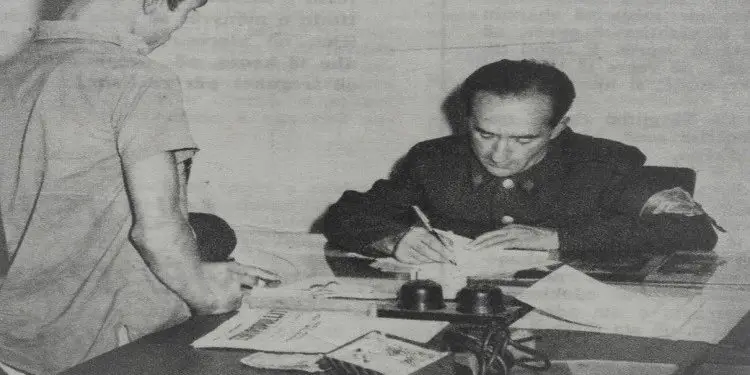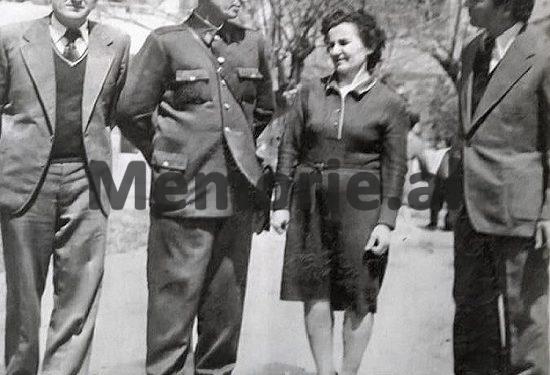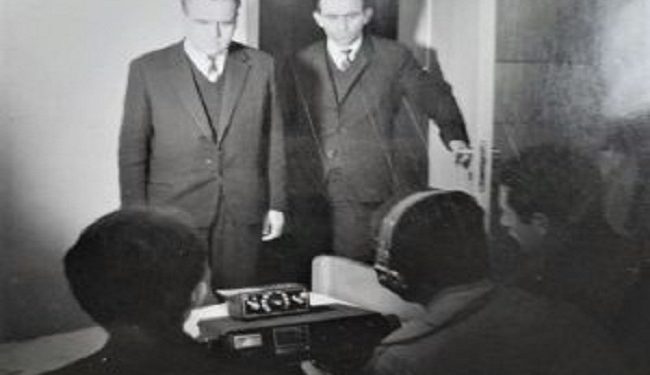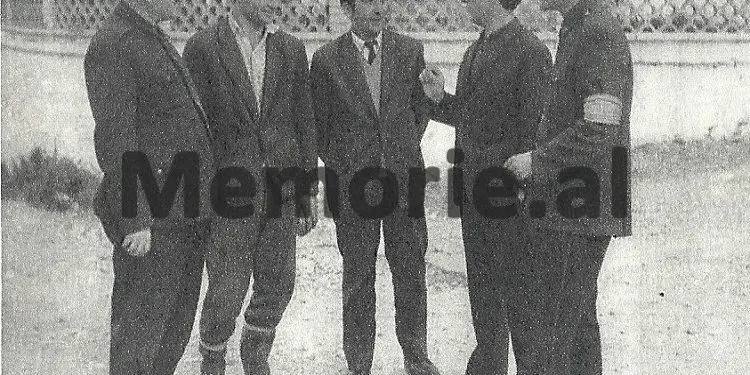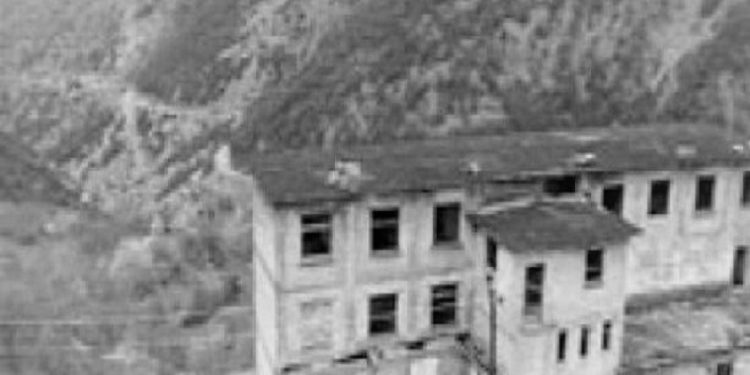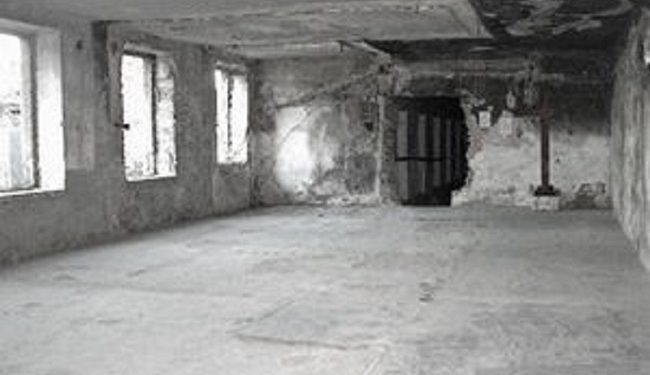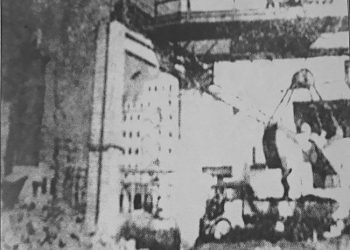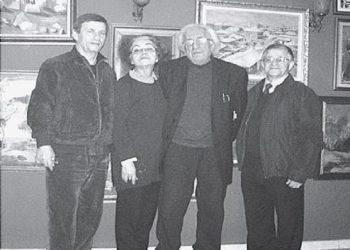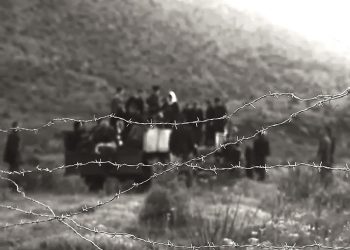By Ferdinand Dervish
-The Security file on the boxer Esat Komti, who set himself on fire in order not to spy on his brother-
Memorie.al / The story of Esat Komti, who set himself on fire in the middle of Tirana, in 1980, in order not to testify against his nephew’s brother, is the second known case in the history of Eastern Communism, after the self-immolation of a Czech student (Jan Palash), in 1969, in the middle of Prague, in protest against the Soviet occupation…” Kurt Kola, former President of the National Association of Political Convicts and Persecuted of Albania, said these words with conviction, but without any emotion special. Maybe because, in his long life, past prisons, lined up on the side of the minority oppressed by the former Albanian communist dictatorship, known by many as the proletariat, he had touched and observed even more painful history…!
In fact, for Esat Komti, the former boxer of the Tirana team, who ended his life in the most savage way possible, until now, the Albanians have not reserved anything similar to what the Czech people and further, the whole part of the civilized world, reserved for the student Jan Palash, who on January 16, 1969, demonstratively set himself on fire in the middle of “Vaclav” square in Prague, as a sign of protest against the occupation of the country by the troops of the “Warsaw Treaty”. This, due to the simple fact that the story has remained unknown, perhaps also because of the family members, who either did not appreciate it enough, or were not given the opportunity to make it public, or, even worse, did not take this opportunity have had
Not finding a single photo of this unusual personage, even on a tombstone, goes to the benefit of this idea. On the other hand, the insistence of Kurt Kola, to make a comparison with the Czech hero, who publicly set himself on fire to give a strong message to his people, for disagreement with the occupation, is not entirely unfounded. Because even the tyrant, Esat Komti, took care to end his life in a way that would leave behind a message as strong as possible. An event that, despite the efforts of the authorities of the time to isolate it, did not remain unconsidered by contemporaries, either as a human value, or as a rebellion against the anti-human system that the regime had built.
An act of manhood, which, at least as such, has no need to be weighed further. Finally, this story, the suicide by burning in protest against the regime, is the only one known in the history of Albanian communism.
The self-sacrifice of Esat Komti…!
After listening to the memories of the former political persecuted of Tirana, acquaintances of the Komti tribe, the event was more or less like this. On May 6, 1980, Esat Komti knocked on his sister’s house, which was located near the former Pastry Shop “Flora”, on “Rruga e Durrës”. Before dousing himself with kerosene, he had asked to take a shower. It was morning, unusual shower time for Albanians of this time, but the sister, like all sisters, had created all the conditions, without asking any questions, without understanding the extreme decision in his eyes, without noticing the shadow of death, which he had started to get tangled up in his brother’s legs. Because, the former professional middleweight boxer of the Tirana team was known, or had created around himself, that impression of a cold man and, to clarify a little, that appearance tired from the many elbows of life, and gnawed by troubles, which he did not confess to anyone.
That’s why the sister also obeyed without asking questions. The first to learn the truth about Esat Komti’s self-immolation were the people of the political police service of the time, or the State Security, as it is known. Because Esat Komti was listed somewhere as their collaborator. The news that he had demonstratively self-immolated had met with sudden fanfare. Because, the people who ensured the whole progress of the health of the ruling caste, who consequently enjoyed absolute support and unlimited power, who had invented and successfully realized a thousand blacks with their own hands, who had succeeded in disfiguring all, as many as they had targeted, regardless of who they were and where they came from, they had never heard of a similar end.
In fact, the case was completely unknown in the history of the entire existence of this organism. Fortunately for them, Esati himself had made everything easier, more explainable. He had made sure that before he left this world, he wrote two letters.
The man who beat the state with his fist…!
The stories of Albanian Communism never begin with “we were like what we used to be”. Because started in this form, the story should end in all cases, with a happy ending, with the phrase: “and they lived happily ever after”. The stories of Albanian communism, especially the feats of the State Security, sitting cross-legged in a poor country with limited cultivation of humanity, are all sad with even sadder endings. Such is the story of the tailor, Esat Komti, from Tirana targeted by the regime, due to his family background, father Islam Komti, who once served as a gendarme of King Zog, and a brother, who for a short time, worked for the guards of finance in Italy.
Data that are read in a document of the State Security, compiled immediately after his death, with the inscription: “Information on the suicide of the associate ‘Luani’ of the Directorate of Internal Affairs, Tirana” and finally signed by Tahir Malo, Director of the First Directorate of State Security. A document, on its last page, “reprimands” the structures of the Security for poor, careless work, which as a result has led the colleague to commit suicide. Esat Komti, according to this document, was an associate of the State Security, with the nickname “Lion”. The same document also explains the circumstances of establishing this nickname.
Because, almost at the top of the explanations, it is noted that: Esat Komti did not have a good attitude towards the regime, that he was sentenced to prison several times, in all cases for beatings, in most of them, precisely for: “insults, threats and hitting the official”. So Esat Komti, was a kind of lion, a fighting type who destroyed the best mugs that came in front of him, whether these people were more powerful or not, whether they were policemen or spies of the State Security. And the details of the document affirm that precisely for this type of unusual behavior, Esat Komti has been punished several times, specifically: “By decision no. 175 dated 13.06.1956, for assaulting an official, he is sentenced to one year of imprisonment and probation for 5 years. By decision no. 246 dated 13.08.1956, sentenced to 8 months of imprisonment for beating.
By decision no. 275, dated 14.09.1957, is sentenced to one year of imprisonment for unworthy behavior in society. By decision no. 58 dated 03.06.1960, is sentenced to one and a half years of imprisonment for threatening and insulting an official. By decision no. 212, dated 24.10.1970, is sentenced to eight years of imprisonment, for violently opposing the representative of the government”. Transcribed, more or less such an overview, it begins by saying that, after beating a man of the state and being locked up in prison, again after two months, he was beaten inside the fence with barbed wire and was again punished. His contemporaries confess that, in his youth, Esat Komti was a middleweight boxer of the Tirana team, while at least in one case of beating, they confirm that the victim was a State Security officer.
So, Esati was an unusual format of those times, who was not afraid to raise his hand against anyone, even though a single punch could cost five or eight years in prison…! This is where the idea of the recruitment masters in the State Security must have arisen, who, after convincing the other, after receiving his approval, for the task, named “Lion” the nickname of their youngest colleague. .
Security Associate
The circumstances in which Esat Komti has agreed to be an associate of the State Security are not written in the information about his suicide. It only reads that he, Esat Komti, “was withdrawn in cooperation from the crime prosecution sector of the Directorate of Internal Affairs in Tirana on 19.11.1966 and expelled in 1968, after his arrest and conviction”. Meanwhile, in the overview of the Komti’s punishments, found on page 2, in the same document, nothing is noted for the period 1966-1968, while the sentence of 8 years of imprisonment, carried out consecutively, “for violently opposing the representatives of power”, bears the date 24.10.1970.
However, the key to Comte’s recruitment seems to lie in his own family, all targeted by the dictatorship of the proletariat. In the document, it is said that their family came from the villages of Kruja to Tirana in 1920, that the surname was changed from Koçi to Komti, that they were engaged in trade and agriculture, that they bought their houses in the capital, that during the time of Zogut, Esat Komti’s father, Islami, was a policeman, a job he left in 1942, because at this time, he had a friendship with his sister’s future husband, Muharrem Tela, who also owned shops and land …! Further, in the same information, it is said that: “the situation of Esati’s family, after the liberation, was not good” and that all Esati’s brothers have tried prison, the eldest, Bastriu, 8 years, the second in line, Bedriu, 3 years, the third, Bahriu, was arrested on April 30, 1980, under the charge of agitation and propaganda against the popular power, and under the same charge, in January 1980, the nephew, Ylvi Komti, was also arrested.
It seems, the existence of such a family, which came from the “way of God”, had forced the State Security to look for an “internal” informant in the enemy tribe “Komti”. Or had everything been an even more diabolical calculation than that. On the other hand, Esat Komti himself, or “Lion”, is not known why he said “yes” to the butchers of his family. Maybe without thinking about it for a long time, maybe to benefit, to enjoy the benefits of a society with few of them, maybe by compulsion, in exchange for a few years less prison, maybe to ensure some protection, for himself and approach, never realizing to the end what it might cost him, never realizing what they really wanted, without immediately learning that their main goal was for him, first and foremost, to spy on his own tribe, beginning with brothers.
That in that regime, in the communist system of Albania, this was how it was built. The brother was asked to spy on the brother, the wife was asked to spy on the husband, the son was asked to spy on the father, the mother on the daughter…! Thus, the State Security read the thoughts among the Albanian family, among the tribe, among the neighborhood, the neighborhood, the city, intervening to make the appropriate modifications, forcing out of the ranks the most dissatisfied with the government, sent to prisons and concentration camps. A genius mind, by means of this system alone, had guaranteed the absolute longevity of power. Once upon a time, the man himself within this system began to fear even the disobedient thoughts in his head.
Nephew, witness…!
“On the morning of May 6, 1980, Esati should have come to testify in my trial. The guard had informed me that I would leave for the courtroom at 10:00. But the hour came and went and I was not disturbed. From lunch, the guard came again telling me that I would not go to court that day. Later I learned that my uncle, Esat, had set himself on fire that morning just so he wouldn’t come to the courtroom and testify against me”, Ylvi Komti, Esat Komti’s nephew, told us in full, with office Secretary of the National Association of Convicted and Politically Persecuted. And the story that follows is incredible.
Ylvi Komti is a living witness of the history of his tribe, targeted by the State Security. “We Komts, especially my uncles, took us all to the police station, whenever foreign delegations came to Tirana. The regime considered us so much ‘brand’, he continued the unusual confession. But Ylviu himself was arrested under surprising circumstances. In 1979, he was working as a designer for the Social Food Company, when he was sent to Korçë for service. On the street, in Elbasan, the State Security kidnapped him with a car and for 14 days in a row – (because such a time, without the measure of arrest, was foreseen by the law) – he was subjected to brutal torture, in order to show his accomplices , who made propaganda against the state.
“They were convinced of what I was doing, as it was not likely that for them, from the Komti tribe, any good plant would come out”, Ylviu Buzagaz recounted with a paternalism characteristic of the old Tirana people. He also remembered the identities of his butchers, Nysret Dautaj, Fatos Trebeshina, E. Kadia, N. Mici…! “He started the uncle first, and when he got tired, he changed to the other one. And they were pretty fleshy. They shot hard and shouted at me: enemy of the people! But an uncle of mine, Bedriu, had taught me, had often repeated to me that, if one day I were to go into the hands of investigators or prosecutors, not to accept anything. Therefore, they had a hard time with me and it seems, to achieve what they wanted, they brought me as a witness in the cell, Esat, the little uncle. But he did not open his mouth. Then what happened happened.
He set himself on fire, just so he wouldn’t come to testify in my trial”, explained Ylviu, a story that is confirmed in the State Security information, about the suicide of the accomplice “Lion”. According to this document, it is said that: “On 26.01.1980, Ylvi Komti was secretly arrested and after 14 days in the investigation, he was not released, he categorically denied that he had carried out hostile activities…”! While Ylli was taken to Elbasan with a bag on his head and tortured in shifts, Bahriu, Esati’s other brother and at the same time his other uncle, was arrested under charges of agitation and propaganda.
“I didn’t manage to learn it very quickly, but it is likely that the arrest of my brother, in addition to my story, burdened Esati and pushed him to commit suicide,” the living witness told us, of one of the most extreme stories of Albanian communism. But here it just starts, just begins. Because the evil for the whole tribe would come immediately after the burning of Esat Komti itself. “On the same night that Esati set himself on fire, the whole neighborhood where we lived, our private houses, were surrounded by the State Security police. They had brought five trucks and forcibly deported our families. They took my family too, of course. But also, the family of the brother, Fatmir, the sisters Violeta and Joldiz, the mother Ikbale, the daughter-in-law of the brother, Melihan, and the son Lukino, at that time one year old, who had been put in the bread shelf, since there was no room in the truck. So, they were buried in Akërni in Vlora, in some army barracks, a deserted place, where some wild, meaty plants grow, all salt”, Ylvi Komti confessed, saving the worst for last.
An end of apocalyptic proportions, albeit for a small community. An ending that reminds you of the invasions and revenge of the armies, or hordes, on the day when they managed to demolish the walls of the castles, the moment that the chroniclers of the time described: “… at the end, after the foundation stones of the castle were uprooted, and they plowed and sowed the ground with salt, so that nothing would grow in the life of lives”. More or less, this was realized with the properties, precisely the dwellings of the Komti tribe, immediately after the exile of human beings on the coast of Vlora.
“I had a beautiful house, about 2,500 square meters, behind the ‘Voice of the People’ building.” But after my imprisonment in Spaç and the exile of my family, the communists demolished the house and on the acquired land, they built two new buildings, which they populated with the families of their children”, Ylvi Komti concludes the essence of the story of his life. without forgetting to add that the houses of his uncles, their sons, had the same fate, while the family that was totally destroyed was exactly that of the one who had just been burned, Esati, as his wife and daughter remained at the mercy of a state that did not know mercy.
The end, like “Lion”…!
“My brothers, they are not enemies. I cannot testify against them. Agent A. Mataj is all to blame for forcing me…! You left me no choice…”! This was more or less the content of Esat Komti’s last letter, before he committed suicide. The letter that had helped the agents of the State Security to quickly understand the reason for the unusual act of the man they considered to be their accomplice. According to the information that the State Security had compiled immediately after the burning of the collaborator “Lion”, Esat Komti, was recruited twice, first in 1966, serving until 1968 and secondly on 17.01.1979.
This time, as an object of work, the State Security had put him under observation… textually in the document: “…to be used in the processing of a group that was developing agitation and hostile propaganda and that consisted of: Bedri Bahri Komti (brothers of ‘Lion’), Ylvi Komti (nephew of ‘Lion’), Jaldez Komti (niece of ‘Lion’), Ali Oseku, and J. and G. Tela (Krushq of the Komti family. ed.), who were taken into active processing 2/A (tracking and surveillance of persons suspected of engaging in hostile activity. Ed.) and PP (preliminary processing. Ed.) and the agency file was opened”.
The State Security, at first glance, seems like it was too much to charge a personality with the characteristics and behaviors of Esat Komti, with spying on his closest people. Because the data of the associate “Lion” was completely clear. He was not lazy with his fists and kicks. Be these people with power or not, including policemen, investigators or even the most invulnerable people themselves, State Security agents. In the information, it is not specified, but the last sentence, that of 1970, with 8 years of imprisonment, with the motivation “for violent opposition to the representative of the government”, is likely to be related precisely to the public beating of a Security agent of the State.
Ylvi Komti, Esat’s grandson, told us such a story, observed with his own eyes. “One day, when the four brothers came out of the police area, Esati, as soon as he saw it, punched and kicked an operative of the State Security, whose name was, make no mistake, Harun. For this, he spent eight full years in prison”, Ylviu recounts a key moment, which illustrates the character of Esat Komti. After his release from prison, in 1979, the State Security contacted Esat Komti again, obtaining his agreement to resume the profession of “collaborator”. It seems, for its part, Esati has not taken the request to spy on the brothers, nephews and nieces very seriously.
Therefore, faced with the fact that it has been committed, with a nephew arrested and sent to court and a brother who has just been arrested, it seems that he cannot find a way out. “On 06.05.1980, as a witness ‘Lion’, he was called as a witness by the court to testify for his nephew, Ylvi Komti. The same day, at 09:30, at his sister’s house, he set himself on fire with kerosene, and at 09:30, he died in the hospital. A notebook was found in the house, where he recorded the reasons for the suicide, where he raised accusations against P. Operative (Operative Worker. Red) A. Mataj, who recovered it and kept it in connection, notes that; his brothers are not enemies and he wants to solve this issue…”, says exactly the information of Sigurimi, about this event.
At the end, on the 5th and last page of this information, we read the weaknesses and flaws “in our work”, that is, in the work of the Security, for this matter. Which are four in total. The first: “The Directorate of Internal Affairs of Tirana, relying on the personality of this person, should not have taken him back in relation to…”! As transcribed, it means that a man with a strong personality, like Esat Komti, who used to take the mugs to anyone, if he had the right, should not have been tasked with spying on his relatives. The second: “The speeding up and bringing out a witness, contrary to the determination to take evidence only for sanctioning, at a time when his brother had also been hit, shocked him and pushed him to commit suicide.”
Which means that even the State Security itself has been in a hurry to bring out the accomplice as a witness, exceeding the usual work norms. The third: “Accelerating and sending Ylvi Komti to court, without analyzing it in the First Directorate, when this problem was pursued centrally, constitutes a violation and has allowed contradictions between the operational and investigative sectors.” Which means that, for Ylvi Komti, who did not open his mouth in 14 days of torture, another solution had to be found. And the fourth: “VIII branch, has not managed the problem well and with a careful work could have eliminated the flaws and prevented this event”. That it is understood what it says. But it doesn’t end here either. The State Security has left behind this document from 1980, where at first sight it seems that he criticizes himself for poor work.
But in the same document, it is not written that, on the day that Esat Komti set himself on fire, his entire tribe was forcibly exiled to a deserted area, chosen as far away from other human beings as possible. That the self-immolation of the “collaborator” did it again, there is not a word about a circular from the 70s-80s, written and signed by Enver Hoxha himself, according to which; “the inverted classes, we must destroy them by using their people, by letting them spy on each other, brother-brother, wife-husband…”! A well-known Albanian architect and painter also experienced such a story, who has declared it to the world: “Even the woman with whom I shared the same bed for many years turned out to be a witness against me in court.”
Therefore, the story of the burning of Esat Komti itself has significant dimensions. A story that in its entirety singles out a man with an indomitable spirit, whose act, burning itself as the only solution to not harming his close people and further, also as a protest against the actions of the communist regime of the time, must at least be respected by the succeeding society.
An unusual story that shows the essence of the so-called Dictatorship of the Proletariat in Albania, where the majority ruled over the minority, a minority which, through the illegal laws it enforced, treated the same as an invading army in the times of the Until the Middle Ages, Guri treated a defeated people, taking away everything, from freedom, wealth to life itself.
Often, accomplishing all this, by means of the most refined crafts, without putting their hands into the fire at all to extract the chestnuts, by means of the method of destruction among them. A social order that should be remembered with shame, without simultaneously forgetting the respect and gratitude for those who resisted it, those who sacrificed to not accept it. /Memorie.al




